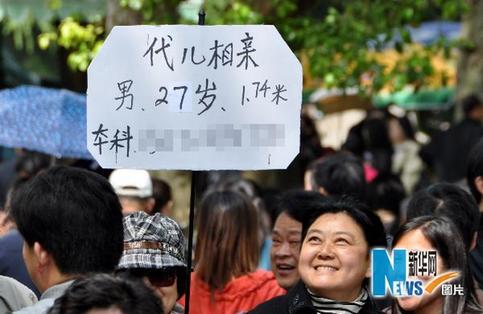神秘内容 Loading...
 (来源:英语麦当劳-英语杂志 http://www.EnglishCN.com) (来源:英语麦当劳-英语杂志 http://www.EnglishCN.com)
BEIJING — Dating is hard at the best of times. In China the stakes are high from the outset: the expectation is that it should lead to marriage; never mind love for love’s sake.
即使万事俱备,相亲也不是一件容易的事。在中国,相亲从一开始就存在高风险:人们期望一段相亲可以最终带领他们走向婚姻,至于爱情,就显得无关紧要了。
A friend recently went on a blind date in Beijing. Arriving at the coffee shop, he found not only the girl but her mother, too. Within minutes she bombarded him with questions: What does he earn? Where did he study? Does he own a house?
我的一位朋友最近参加了北京的一场相亲会。当他到达那家咖啡店时,他发现和相亲对象同时出现的还有她的母亲。短短几分钟内那位母亲向他扔出了一连串的问题:你赚多少钱?你从哪里毕业的?你有房子吗?
Romance in China is often sacrificed to practicality; dating has largely become a commercial transaction. In Beijing parents gather in parks to introduce their children to one another. Singles’ clubs set people up according to requirements — height, income, property. And tens of thousands descend on matchmaking events in cities like Shanghai looking for the perfect mate.
在中国,浪漫总是败给现实;相亲从很大程度上已经变成了一种交易。在北京,有许多父母聚集在公园里,把自己的孩子介绍给多位异性。单身俱乐部把客户按照他们的要求进行划分——身高、收入、财产。在上海这样的城市里,成千上万的人们涌向各种相亲活动,期待找到那个完美伴侣。
For Chinese men today, being the perfect mate means having a car, an apartment, a good salary and, preferably, a tall stature. Women, meanwhile, must be married by 27; after that they are branded sheng nu or “leftover women.” (This derogatory term — whose prefix “sheng” is the same word used in “leftover food” — was listed as a new word in 2007 by the Chinese Ministry of Education).
对于当今中国的男人们来说,完美老公的定义是有车有房,高收入,如果身高也不错就更完美了。而女人们一定要在27岁之前嫁出去,否则就会被贴上“剩女”的标签。(“剩女”是一个贬义词,其中“剩”和“剩饭”里的“剩”是一个意思,而这个词已经在2007年被中国教育部收录为新词。)
“Marriage in many ways in China is a way of pulling resources,” says Roseann Lake, a Beijing-based journalist researching a book on sheng nu. In one direction, at least. “The idea that a woman, no matter how successful she is professionally, is absolutely nothing until she is married — it still comes down to that.”
“中国的婚姻在许多方面就是财力的比拼,”一名常驻北京的记者罗斯安-雷克说。她正在研究一本关于剩女的书。至少在某种程度上来说是这样的。“有一种观点认为,一个女人无论在事业上多么成功,如果没有结婚她就依然一无所有。而这种观念依然大行其道。”
Matchmaking — through work units and family — was, and still is, commonplace. The one-child policy has further reinforced these expectations. With no welfare system in China, the young are expected to provide for the old: whom you marry matters for your entire family.
不管是过去还是现在,牵线配对依然非常普遍,无论是在工作单位还是在家庭环境中。计划生育政策又进一步助长了这种观念。由于中国欠缺社会福利体系,人们普遍认为年轻人应该供养老人。因此你和谁结婚事关整个家庭。
These concerns aren’t evenly shared, and they expose something of a generation gap. Children of the 1980s and 1990s — who were born in better economic times and fed on pop music and movies — are in less of a hurry to get married than their parents were.
并不是所有人都认同这种观念,这也从某种程度上反映出了代沟。生于80和90年代的孩子享受了更好的经济环境,他们听着流行音乐、看着电影长大——他们对于婚姻的渴望并不像他们的父辈那样强烈。
The best-selling author Wang Hailing, who wrote “Divorce with Chinese Characteristics,” relays stories of pushy mothers on her micro-blog. One told her daughter to attend blind dates while she’s still at a “valuable” age.
畅销书作家、《中国式离婚》的作者王海鸰在她的微博上连载心急的妈妈们的故事。有一位母亲让自己的女儿去相亲,虽然她的女儿还没有到“剩女”的年纪。
Xie Yujie, a 26-year-old resident of Wenzhou, a city of more than nine million some 230 miles south of Shanghai, is unmarried. Despite a promising career as a nurse, her parents remind her daily of her filial duties to find a husband. Xie is looking for love, but her parents chastise her for not being more practical. “Money worship and materialism is the reality,” she explained last week.
26岁的谢玉洁(音)还是单身,她来自温州,一个有900多万人口、位于上海以南大约230英里的城市。她是一名护士,虽然这个职业不错,她的父母依然每天提醒她要找老公以尽孝道。谢玉洁想要追寻真爱,可她的父母却怪她太不现实。“拜金主义和物质主义才是现实,” 她解释说。
And so now some single women in Chengdu, in southwest China, pay more than $3,100 for a special training course in how to snag a millionaire husband. |

